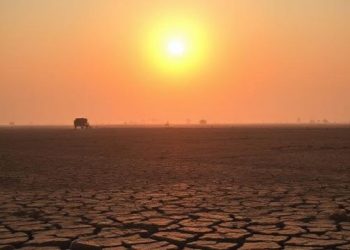First Heatwave of the Year to Hit Pakistan, PMD Issues Warning
Rawalpindi / Lahore: The Pakistan Meteorological Department (PMD) has warned that the country will face its first heatwave of the year starting today (Thursday). Temperatures are expected to rise above normal in many areas and may continue for the next three to four days.
According to the PMD, a high-pressure weather system will affect most parts of the country from May 15 to 20. During this period, temperatures in southern areas — including Sindh, southern Punjab, and Balochistan — will likely remain 4 to 6°C higher than usual.
In central and upper Punjab, Islamabad, Khyber Pakhtunkhwa, Azad Jammu and Kashmir, and Gilgit-Baltistan, the temperature may rise 5 to 7°C above normal from May 15 to 19.
A new western weather system is also expected to enter the upper parts of the country on the evening or night of May 19. Due to this, rain, strong winds, and thunderstorms with chances of hail are expected in parts of Azad Kashmir, Islamabad, northeast Punjab, Pothohar region, upper KP, and Gilgit-Baltistan on May 19 and 20.
Public Advised to Take Precautions
The PMD has advised the public, especially children, the elderly, and women, to stay safe during the heatwave. People are urged to avoid direct sunlight and drink plenty of water.
ALSO READ >> >> Summer vacation dates for Punjab schools likely to be revised due to heat
Farmers have been asked to adjust their work schedules and take care of their animals. Authorities have also been told to stay alert, as high temperatures may cause snow to melt quickly in northern areas, which could increase water flow in rivers.
PDMA Issues Heatwave Alert in Punjab
In Punjab, the Provincial Disaster Management Authority (PDMA) has issued a heatwave alert. All commissioners and deputy commissioners have been told to stay prepared.
PDMA Director General Irfan Ali Kathia instructed departments like health, education, transport, and local government to take early action. These steps include setting up drinking water stations and ensuring that hospitals and mobile units are ready to provide first aid.
People have been advised to take special care of children, the elderly, and those working outdoors. They should avoid going out during peak afternoon hours, wear light-coloured clothes, and cover their heads when stepping outside.
The PDMA also urged the public to use water carefully and stay informed about weather updates.
Health Advisory for Heatstroke
The National Institute of Health (NIH) had already issued a heatstroke advisory last month. Hospitals have been asked to prepare for more heat-related cases.
According to the advisory, climate change is increasing the number of heatwaves in Pakistan, which may lead to more illnesses and deaths. Vulnerable groups — such as infants, elderly people, pregnant women, and outdoor workers — are at higher risk of heatstroke.
The NIH said that public and private health departments must take timely action to prevent heatstroke and protect people from extreme heat.













